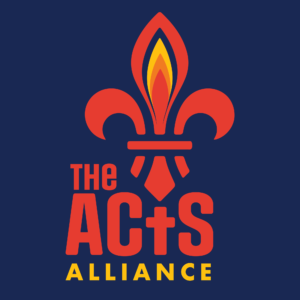
Invocation
In the name of the Father, and of the Son, and of the Holy Spirit. Amen.
Word
“‘If then God gave the same gift to them as he gave to us when we believed in the Lord Jesus Christ, who was I that I could stand in God’s way?’ When they heard these things they fell silent. And they glorified God, saying, ‘Then to the Gentiles also God has granted repentance that leads to life.”’ Acts 11:17-18
Meditation
Today’s meditation is written by Megan Roegner.
One of the things I’ve thought a lot about this year is the difference between diversity and inclusion. Diversity is a state of being—it’s variety. But inclusion requires action—it means ensuring that diverse people belong.
I generally feel like I belong wherever I am. It’s rare that I go places where I do not see plenty of other people who look like me, dress like me, speak like me, and share many of the same experiences. This is true for the media I consume as well: The books and articles that I read, the shows that I watch, the music and news that I listen to overwhelmingly are produced by people who share my cultural ethos.
That’s why it’s a bit shocking to read the controversy in the early chapters of Acts regarding the Gentiles. They’re talking about whether or not to include me! Peter’s vision about the “great sheet descending” is so important that it’s recorded twice: Once in Acts 10 and then right away again in Acts 11. The repetition emphasizes the enormity of the shift that was happening in the early days of the church. The first followers of Jesus were Jews, whose laws and customs, such as circumcision and dietary restrictions, had helped maintain their identity as God’s chosen people throughout a tumultuous history. And, suddenly, everything changed—the things and people once regarded as “common and unclean” were “made clean,” and their primary identity became “Christian,” an identity that is not bound by culture or ethnicity.
The act of inclusion can be uncomfortable. It often challenges people to reassess closely held values, practices, and beliefs. Many times it requires repentance for attitudes and actions that have excluded others in the past. As I’ve sought out a greater diversity of perspectives this year, I’ve often been convicted as I realize that the sense of belonging I’ve always taken for granted is not shared by all of my fellow Americans, even within the church. Because when we have the security of belonging, it is our responsibility to include others.
When Peter shared his vision with his fellow Jewish Christians, “they fell silent” for just a moment, then almost immediately “glorified God, saying, ‘Then to the Gentiles also God has granted repentance that leads to life.’” When they were led to inclusion, they did so, not just dutifully but with joy. Those early Christians were following in the footsteps of Jesus, who spent his ministry radically including the lonely, the outsiders, and the socially vulnerable. In Jesus, we all belong equally. Inclusion is the legacy of the church, which, as Austin Channing Brown writes in I’m Still Here, is “a universal body of belonging, [a] community that reaches toward love in a world so filled with hate.”
Dear Jesus, thank you for making us belong to you. Forgive us for the times when we have failed to include others, and help your church heal brokenness and division. Let all who seek belonging find it in us and in you. Amen.
For My Close Christian Community
- For a few close and trusted Christian brothers or sisters. Give me encouragement, accountability, godly counsel, and Christian love through these relationships.
- For a haven of Christian community where I can be loved in Christ, and from that love be sent into the world.
- For honest speech and mutual love and care for one another.
Benediction
May the almighty and merciful God, Father, Son and Holy Spirit, bless and keep us. Amen.
